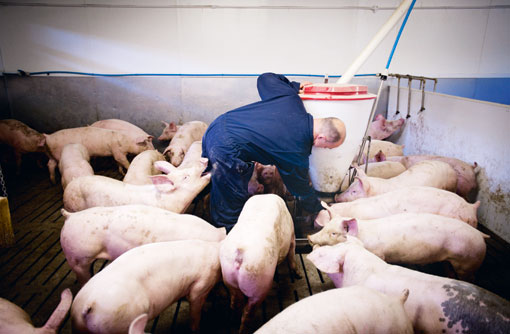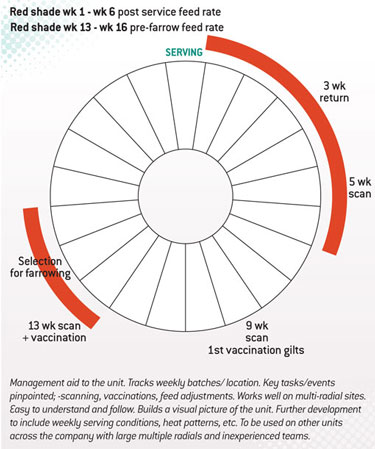Staff management crucial to success of pig performance

Many pig producers believe managing their pigs correctly is the key to success, but ensuring staff are managed properly is just as important. Gemma Mackenzie reports.
Creating daily and weekly management plans and taking the time to explain the “who, what, why, where and when” to staff has paid dividends for Andrew Palmer – a fieldsperson for Dent, managing three outdoor pig units in Lincolnshire and Yorkshire.
Following completion of BPEX’s Professional Manager’s Development Scheme (PMDS) course, Mr Palmer made changes to his people management strategy which has improved team moral and helped lower staff turnover.
He says: “You can have all the buildings and equipment in the world, but if you have a rubbish team you are not going to get the performance. Staff make a big difference on a unit; people are really important.”
 One such management change is a pig management wheel (left), based on the old dairy wheel used by dairy farmers to know when to dry cows off.
One such management change is a pig management wheel (left), based on the old dairy wheel used by dairy farmers to know when to dry cows off.
The wheel is based around a 21-week cycle, with markers to tell staff when the pigs are due a scan or vaccinations, as well as markers telling them when to increase or decrease feed. It is rotated every week telling staff what procedures to carry out with each individual group of pigs.
Mr Palmer says: “I was constantly banging my head against the wall wondering why people didn’t understand things, but pictures speak louder than words. It benefits everyone.”
In addition, he has developed daily and weekly management plans, which are supplemented with site-specific instructions on a whiteboard.
“We have done it across the board. We had a problem with turnover of staff and we learnt the hard way that if everything is written down on the board the staff cannot then turn around and say they didn’t know to do it,” explains Mr Palmer.
He says the main reason he enrolled on the 18-month course was to tackle the “big stumbling block” of people management.
“I have learnt how to understand people and how they learn, and I have learnt about building teams. I have changed myself a bit and how I deal with people – I am now more praiseworthy and more tolerant.
“I would fully recommend anyone to do the course. One of the big pluses was similar people and having someone to talk to who has been in the same boat as you and having the same problems as you.”
Course leader Alistair Gibb says the aim of the course, which is accredited by the Institute of Leadership and Management, is to promote a “professional approach to management” in the pig industry.
“It does not matter what sector of the industry you are in, as soon as you have people working under you that’s where the challenge lies. The key to success is not managing the pigs, but managing the people.”
Mr Gibb says good management is the key to a successful business, and a well motivated team will deliver “exceptional results”.
Commenting on what PMDS course graduates have achieved, he says by changing how they manage their units, they have generated improvement of performance on their farms.
“This has come from more effective planning and organisation, increased confidence to challenge standards of performance, adjusting the way they lead and managing their staff more,” he adds.
“I think they have become more comfortable being away from the unit and relying on the team to get the work done in their absence. Part of it is the ability to step back from the day-to-day stuff and reflect on what they are doing and what they might change.”
Helen Hooks’ story
Helen Hooks gives technical advice to pig producers on a daily basis in her role as fieldsperson for British Quality Pork (BQP).
Following completion of the PMDS course, she has gained more confidence, learnt how to manage her time better, and improved her advisory role to the farmers she visits.
• Hear first hand from Helen about her role and what she gained from the course:
